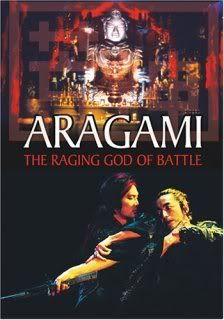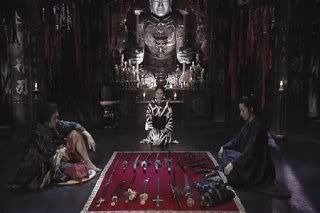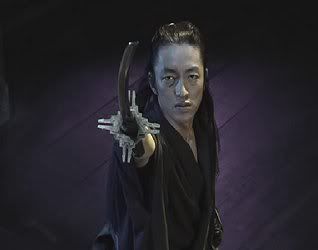
As the story goes, Yukihiko Tsutsumi and Ryûhei Kitamura each finished their personal contributions to a short film anthology entitled Jam Films (2002) in record time.
As a result, producer Shinya Kawai threw down a punk card to both directors.
Each was create (not just writing and filming, we're talking total completion) a feature length movie in less than ten days, with the optimum time frame being a week.
The film had to feature two primary antagonists, no more than three supporting characters, a static setting, and it had to conclude with a showdown between the two key players.
The undertaking was called the Duel Project.
Yukihiko Tsutsumi's final product was the film 2LDK (2003), which I will be reviewing in the near future for the Japanese Cinema Blogathon.
Kitamura-san's idea turned out to be an engaging piece of work called Aragami.

As a result, producer Shinya Kawai threw down a punk card to both directors.
Each was create (not just writing and filming, we're talking total completion) a feature length movie in less than ten days, with the optimum time frame being a week.
The film had to feature two primary antagonists, no more than three supporting characters, a static setting, and it had to conclude with a showdown between the two key players.
The undertaking was called the Duel Project.
Yukihiko Tsutsumi's final product was the film 2LDK (2003), which I will be reviewing in the near future for the Japanese Cinema Blogathon.
Kitamura-san's idea turned out to be an engaging piece of work called Aragami.

Aragami takes place arguably sometime during the latter part of the Bakumatsu; the final years of the Edo Period that signaled the end of the Tokugawa Shogunate.
The action picks up with a badly injured samurai (Takao Osawa) and his nearly dead companion (Hideo Sakaki) finding refuge from a brutal storm inside the walls of a mysterious temple. The companion dies, but the remaining samurai is miraculously nursed back to health by a powerful swordsman (Masaya Kato) and his female companion (Kanae Uotani).
Over the course of the evening, the swordsman engages the samurai in a rather profound dialogue with topics ranging from battle tactics to reincarnation. The swordsman even claims to have been the great Miyamoto Musashi in a former life.
The samurai responds with mild amusement that gradually evolves into outright jovial disbelief.
But this is no laughing matter. The swordsman in actuality is a kami; an immortal being whose sole purpose is to hone his martial prowess far beyond that of normal men and pit his skill against the skill of other fighters. However, the one thing that centuries of existence has taught the kami is that everlasting life isn't all that it's cracked up to be.
The samurai then discovers the reason that his life has been spared. The swordsman's greatest desire is to give up his immortality and pass his mantle on to a successor. But it is not a mantle that can be freely given.
It has to be earned in a duel to the death.

The action picks up with a badly injured samurai (Takao Osawa) and his nearly dead companion (Hideo Sakaki) finding refuge from a brutal storm inside the walls of a mysterious temple. The companion dies, but the remaining samurai is miraculously nursed back to health by a powerful swordsman (Masaya Kato) and his female companion (Kanae Uotani).
Over the course of the evening, the swordsman engages the samurai in a rather profound dialogue with topics ranging from battle tactics to reincarnation. The swordsman even claims to have been the great Miyamoto Musashi in a former life.
The samurai responds with mild amusement that gradually evolves into outright jovial disbelief.
But this is no laughing matter. The swordsman in actuality is a kami; an immortal being whose sole purpose is to hone his martial prowess far beyond that of normal men and pit his skill against the skill of other fighters. However, the one thing that centuries of existence has taught the kami is that everlasting life isn't all that it's cracked up to be.
The samurai then discovers the reason that his life has been spared. The swordsman's greatest desire is to give up his immortality and pass his mantle on to a successor. But it is not a mantle that can be freely given.
It has to be earned in a duel to the death.

Like most people, my first experience with Kitamura-san's work was the oft-maligned but ridiculously enjoyable, Versus (2000). Aragami represents a dramatic departure from the over the top heroics of Versus and Kitamura's light-hearted and bloodsoaked ninja epic, Azumi (2003).
Aragami is a surprisingly mature film. Kitamura manages not only to show his reverence for the folklore of his homeland while simultaneously poking fun at it, but also accomplishes the impressive feat of creating an ever-growing web of tension by use of one of the strangest plot devices I've ever seen.
A philosophical discussion over a cup of tea.
Even more arresting is the fact that when you do the math, this film consists of only two fights in its 79 minute runtime.
The rest is pure dialogue, yet Aragami never seems to drag.
The progressively grave tone of the conversation is like a clock of armageddon ticking down to the time when the swordsman and the samurai will draw steel against one another and find out whom fate truly favors.

Aragami is a surprisingly mature film. Kitamura manages not only to show his reverence for the folklore of his homeland while simultaneously poking fun at it, but also accomplishes the impressive feat of creating an ever-growing web of tension by use of one of the strangest plot devices I've ever seen.
A philosophical discussion over a cup of tea.
Even more arresting is the fact that when you do the math, this film consists of only two fights in its 79 minute runtime.
The rest is pure dialogue, yet Aragami never seems to drag.
The progressively grave tone of the conversation is like a clock of armageddon ticking down to the time when the swordsman and the samurai will draw steel against one another and find out whom fate truly favors.

It really bums me out that Midnight Meat Train (2008) (a film I reviewed on this very blog) did rise to great prominance here in the US (Up yours, Lionsgate!), because Kitamura is a man that has a lot to offer not only to Japanese film, but film as a whole.
Hopefully the lack of mainstream success will not deter him from expanding his entertaining body of work. It is also my hope that some producer will find it in his heart to call out Kitamura's creative streak once more if this is the type of finished work we can expect from such a dare.
Hopefully the lack of mainstream success will not deter him from expanding his entertaining body of work. It is also my hope that some producer will find it in his heart to call out Kitamura's creative streak once more if this is the type of finished work we can expect from such a dare.










2 comments:
I enjoyed LD2K but hadn't seen a good review of Aragami before now. I enjoy most of Kitamura's films Can't wait to see LoveDeath) and will now seek this one out.
Thanks for dropping by the blog, Mark!
I think the reason that Aragami is so offputting to some members of the rank & file is because it is so unlike most of Kitamura's other work, even though it is pretty much another branch of the Versus-verse.
Kitamura definitely needs to diversify his projects, lest he be consumed by his own forumla.
Post a Comment